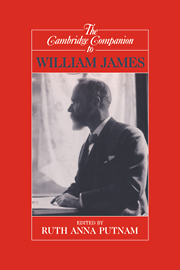Book contents
- Frontmatter
- Introduction
- 1 Pragmatism and introspective psychology
- 2 Consciousness as a pragmatist views it
- 3 John Dewey's naturalization of William James
- 4 James, Clifford, and the scientific conscience
- 5 Religious faith, intellectual responsibility, and romance
- 6 The breathtaking intimacy of the material world
- 7 James, aboutness, and his British critics
- 8 Logical principles and philosophical attitudes
- 9 James's theory of truth
- 10 The James/Royce dispute and the development of Jarnests "solution"
- 11 William James on religious experience
- 12 Interpreting the universe after a social analogy
- 13 Moral philosophy and the development of morality
- 14 Some of life's ideals
- 15 “A shelter of the mind”
- 16 The influence of William James on American culture
- 17 Pragmatism, politics, and the corridor
- 18 James and the Kantian tradition
- Bibliography
- Index
8 - Logical principles and philosophical attitudes
Peirce's response to James's pragmatism
Published online by Cambridge University Press: 28 May 2006
- Frontmatter
- Introduction
- 1 Pragmatism and introspective psychology
- 2 Consciousness as a pragmatist views it
- 3 John Dewey's naturalization of William James
- 4 James, Clifford, and the scientific conscience
- 5 Religious faith, intellectual responsibility, and romance
- 6 The breathtaking intimacy of the material world
- 7 James, aboutness, and his British critics
- 8 Logical principles and philosophical attitudes
- 9 James's theory of truth
- 10 The James/Royce dispute and the development of Jarnests "solution"
- 11 William James on religious experience
- 12 Interpreting the universe after a social analogy
- 13 Moral philosophy and the development of morality
- 14 Some of life's ideals
- 15 “A shelter of the mind”
- 16 The influence of William James on American culture
- 17 Pragmatism, politics, and the corridor
- 18 James and the Kantian tradition
- Bibliography
- Index
Summary
INTRODUCTION: TWO PRAGMATISTS
William James was generous in acknowledging his debts to fellow pragmatist Charles Sanders Peirce. As well as dedicating The Will to Believe to his “old friend . . . to whose philosophical comradeship in old times and to whose writings in more recent years I owe more incitement and help than I can express or repay,” he emphasized Peirce's role in the birth of pragmatism in lecture 2 of Pragmatism: A New Name for some Old Ways of Thinking. Remarking that the word “pragmatism” derives from the Greek word for action from which our words “practice” and “practical” come, he noted that it was “first introduced into philosophy by Mr. Charles Sanders Peirce in 1878” (P, 28). In one respect, memory failed him: Peirce did not use the word in print in the papers James referred to - he did not use it in print (or, indeed, in his manuscripts) until after James had done so. But the views expressed in Peirce's writings of 1878 had been presented and discussed in a “Metaphysical Club” whose regular meetings both attended. Peirce later recalled:
1871, in a Metaphysical Club in Cambridge, Massachusetts, I used to preach this principle as a sort of logical gospel, representing the unformulated method followed by Berkeley, and in conversation about it I called it “Pragmatism.” In December [November] 1877 and January 1878 I set forth the doctrine in the Popular Science Monthly. (CP, 6.482)
- Type
- Chapter
- Information
- The Cambridge Companion to William James , pp. 145 - 165Publisher: Cambridge University PressPrint publication year: 1997
- 4
- Cited by



